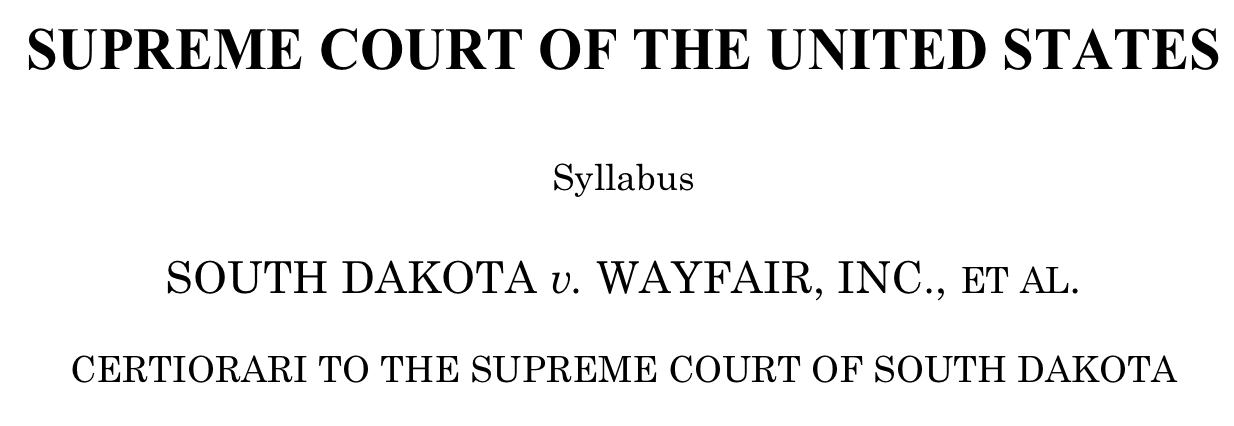
Today the U.S. Supreme Court ruled to allow the collection of internet sales tax on more online purchases in the case of South Dakota v. Wayfair. The case challenges the initial decision in Quill Corp v. South Dakota from 1992 in which the court set property and employee standards for collecting taxes on interstate commerce.
The ruling could prove to show substantial revenue increases among all states.
You can view the Court’s decision on the case BELOW:
According to Justice Kennedy:
That said, South Dakota’s tax system includes several features that appear designed to prevent discrimination against or undue burdens upon interstate commerce. First, the Act applies a safe harbor to those who transact only limited business in South Dakota. Second, the Act ensures that no obligation to remit the sales tax may be applied retroactively. S. B. 106, §5. Third, South Dakota is one of more than 20 States that have adopted the Streamlined Sales and Use Tax Agreement. This system standardizes taxes to reduce administrative and compliance costs: It requires a single, state-level tax administration, uniform definitions of products and services, simplified tax rate structures, and other uniform rules. It also provides sellers access to sales tax administration software paid for by the State. Sellers who choose to use such software are immune from audit liability. See App. 26–27. Any remaining claims regarding the application of the Commerce Clause in the absence of Quill and Bellas Hess may be addressed in the first instance on remand.
South Dakota claimed that ‘times have changed’ and vendors who do not have a physical address within a state should now be charging a sales tax on purchases coming into the state, just like businesses with physical address are required to do.
What this means for Mississippi is a potential massive increase in state revenue and specifically for our state, a chance at a Special Session. Legislation was offered by the House during the 2018 Session that would put these internet sales tax dollars toward fixing the state’s major infrastructure needs.
“As always, whether I agree or disagree with the Court’s decision, I accept that it is now the law of the land,” said Gov. Phil Bryant.
Clay Chandler, a spokesperson for the Governor said, “Gov. Bryant remains in discussions with legislative leadership about a potential special session. If those discussions produce a framework, he’ll call one.”
Mississippi has been collecting what the state calls a “use tax” on some volunteered internet sales taxed from retailers like Amazon. This decision could now include those who were not volunteering the tax.
According to the Federal Tax Foundation the pressure now lies on Congress and the states as to how today’s decision will be applied. Congress has been considering two options before the Court’s ruling: Remote Transactions Parity Act (RTPA) or Marketplace Fairness Act (MFA), which lets states collect if they agree to simplify their sales taxes, and a proposal from retiring Rep. Bob Goodlatte (R-VA) that would make the sales tax a business obligation rather than a consumer obligation, and have it collected based on the tax rate where the company is located but send the revenue to the jurisdiction where the customer is located.
Attorney General Jim Hood had this to say on the decision:
“Today’s ruling is a victory for our Main Street merchants in Mississippi. It puts them on a level playing field with large, out-of-state and international corporations. We attorneys general have been extremely successful in convincing the United States Supreme Court that the United States Constitution protects the states from federal legislative and judicial overreach. I don’t think I have lost on any of these cases where huge international corporations try to use our Congress or federal courts to preempt state laws designed to protect our consumers and state laws.
“I have supported an internet sales tax from the beginning, not only because it will bring an estimated $50 million in the first year for our state, but because this means our local brick and mortar stores are now on a level playing field with businesses that have no storefront in Mississippi. Before Amazon and others started paying voluntarily, the estimated internet sales tax collection for Mississippi was $134 million. Sales taxes from internet purchases from companies without in-state stores were already owed. It was just a matter of who collected it.
“We live in a digital age, and our laws must reflect that. Online shopping may be convenient, but it’s had a negative impact on our Main Street merchants who have always been required to charge a sales tax. When our local businesses suffer, so do we. Now, there’s no difference in someone walking into a store to buy shoes and sitting on their coach and doing the same thing from their phone. Today’s ruling makes it a fairer market and creates an opportunity for our cash-strapped state to bring in a new revenue stream to fix our deteriorating roads and bridges and fund our children’s education.”
Russ Latino, State Director for Americans for Prosperity Mississippi, said, “Amazon and most big online retailers are already collecting and remitting sales tax in Mississippi. The decision won’t have the profound impact on Mississippi’s revenue collection that many have predicted. It won’t change the retail trajectory away from online sales. What it will do is make starting and operating a small online business much more complicated, as companies without lawyers and accountants navigate laws in nearly 10,000 tax jurisdictions across America. If this was always about tax “fairness” and not about increasing the size of government, the legislature will no doubt act to reduce income taxes to match new internet sales tax revenue. If we really want a fairer tax code, we could lower income taxes even more and cut out all the sales tax exemptions that have been created for connected industries.”












